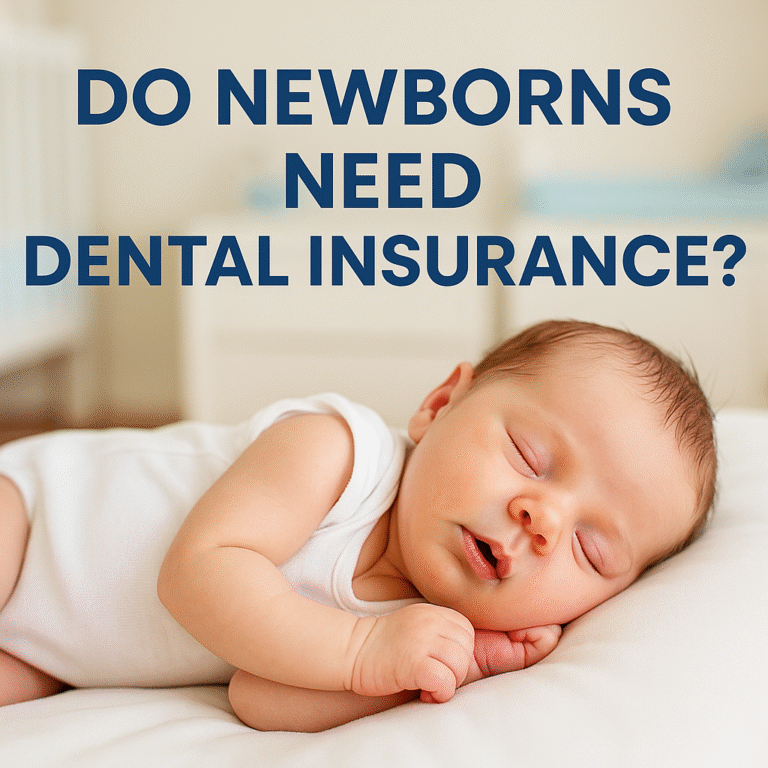Welcoming a newborn into the world is a joyous experience, full of love, care, and responsibility. As parents plan for every little detail, one question often arises: do newborns need dental insurance? This article explores the importance of early dental care, how insurance fits into the picture, and what smart parents should consider when protecting their baby’s smile from day one.
When Do Babies Start Developing Teeth?
A baby’s teeth begin forming before birth, but the first tooth usually appears around six months. Teething continues through toddlerhood, with all primary (baby) teeth usually in place by age three. During this phase, good oral health habits lay the foundation for lifelong dental well-being. Many experts, including the American Academy of Pediatric Dentistry (AAPD), recommend a dental checkup by the time the first tooth erupts or by the baby’s first birthday.
Is Dental Insurance Necessary Before the First Tooth?
While it might seem early, dental insurance can be valuable even before a baby’s first tooth arrives. Infants can develop oral health issues like gum infections or early childhood caries (tooth decay in babies). A visit to a pediatric dentist helps detect issues early and guides parents on proper oral care. Without insurance, these visits can be costly. Coverage helps parents stay ahead of problems while saving on expenses.
Preventive Pediatric Dental Care: What Parents Should Know
Prevention is the most powerful tool in pediatric dentistry. Dental insurance often covers preventive services like routine exams, fluoride treatments, and cleanings. These simple steps can prevent tooth decay, saving parents from costly treatments later. Pediatric dentists also educate parents on nutrition, teething remedies, pacifier habits, and brushing techniques, building a lifelong dental care routine from the start.
What’s Typically Covered in Pediatric Dental Insurance?
Most pediatric dental plans include essential services such as:
- Routine checkups
- X-rays
- Fluoride treatments
- Dental cleanings
- Sealants
Some plans also offer coverage for fillings, crowns, and emergency care. Parents should always review what’s covered, what the limits are, and which providers are in-network.
Medicaid and CHIP: Do They Cover Infant Dental Care?
Yes, both Medicaid and the Children’s Health Insurance Program (CHIP) offer dental benefits for eligible families. In most states, dental coverage for children is mandatory through these programs, ensuring all kids get access to basic dental services. These include preventive visits, emergency care, and medically necessary procedures. This makes them a trusted and cost-effective option for families on a budget.
Private vs. Employer-Provided Dental Plans for Babies
Parents with employer-sponsored dental plans can usually add a newborn within 30 to 60 days after birth. This qualifies as a life event under most insurance policies. If you’re purchasing a private plan, you can explore family plans that include pediatric coverage. Always check the eligibility window and compare premiums, deductibles, and out-of-pocket maximums.
How Much Does Pediatric Dental Insurance Cost?
Pediatric dental plans are often affordable. Monthly premiums range from $10 to $40 depending on coverage, provider, and location. Medicaid or CHIP may cost nothing for qualifying families. Private insurance may include co-pays, deductibles, or limits on specific services, so it’s important to read the fine print and assess what value you’re getting.
Alternatives to Traditional Dental Insurance
If traditional insurance isn’t an option, there are alternatives:
- Dental discount plans: Members pay an annual fee for reduced rates on services.
- In-house dental memberships: Offered by some pediatric dentists for preventive care.
- Health Savings Accounts (HSAs) or Flexible Spending Accounts (FSAs): Allow pre-tax savings for health expenses, including dental care. These options help manage costs while still ensuring quality dental care for your baby.
Final Verdict: Is It Worth Getting Dental Insurance for a Newborn?
Absolutely. Early dental insurance means early care, which means fewer problems down the road. Whether through Medicaid, CHIP, or private plans, getting your newborn insured gives peace of mind. With preventive care, education, and access to treatment, dental insurance supports a bright, healthy smile from the very beginning.
It’s just one more way to set your baby up for lifelong health—and one less thing to worry about.
While you’re managing your family’s coverage, you might also be wondering how to cancel Farmers Insurance if you’re switching providers. Or maybe you’re curious, does insurance cover skin tag removal for your own health needs? These are common questions, and managing insurance effectively helps your whole family thrive.
FAQs About Do Newborns Need Dental Insurance
When should a baby first go to the dentist?
Experts recommend that babies visit a pediatric dentist when their first tooth appears or by their first birthday. Early visits help detect problems and start healthy habits early.
Is dental insurance included in newborn health plans?
Not always. While some health insurance plans may cover basic oral screenings during well-baby visits, dental insurance is typically a separate policy that must be added to your family plan.
Can I add my newborn to my existing dental plan?
Yes. Most employer-provided and private insurance plans allow you to add a newborn within 30-60 days of birth as part of a qualifying life event.
How much is dental insurance for infants?
On average, pediatric dental plans cost between $10 and $40 per month, depending on coverage levels and location. Government programs may offer free or low-cost coverage to eligible families.
What happens if my baby doesn’t have dental insurance?
Without insurance, you’ll pay out-of-pocket for exams, preventive care, or any treatment. This can quickly become expensive, especially if your baby needs emergency dental work or treatment for decay.
